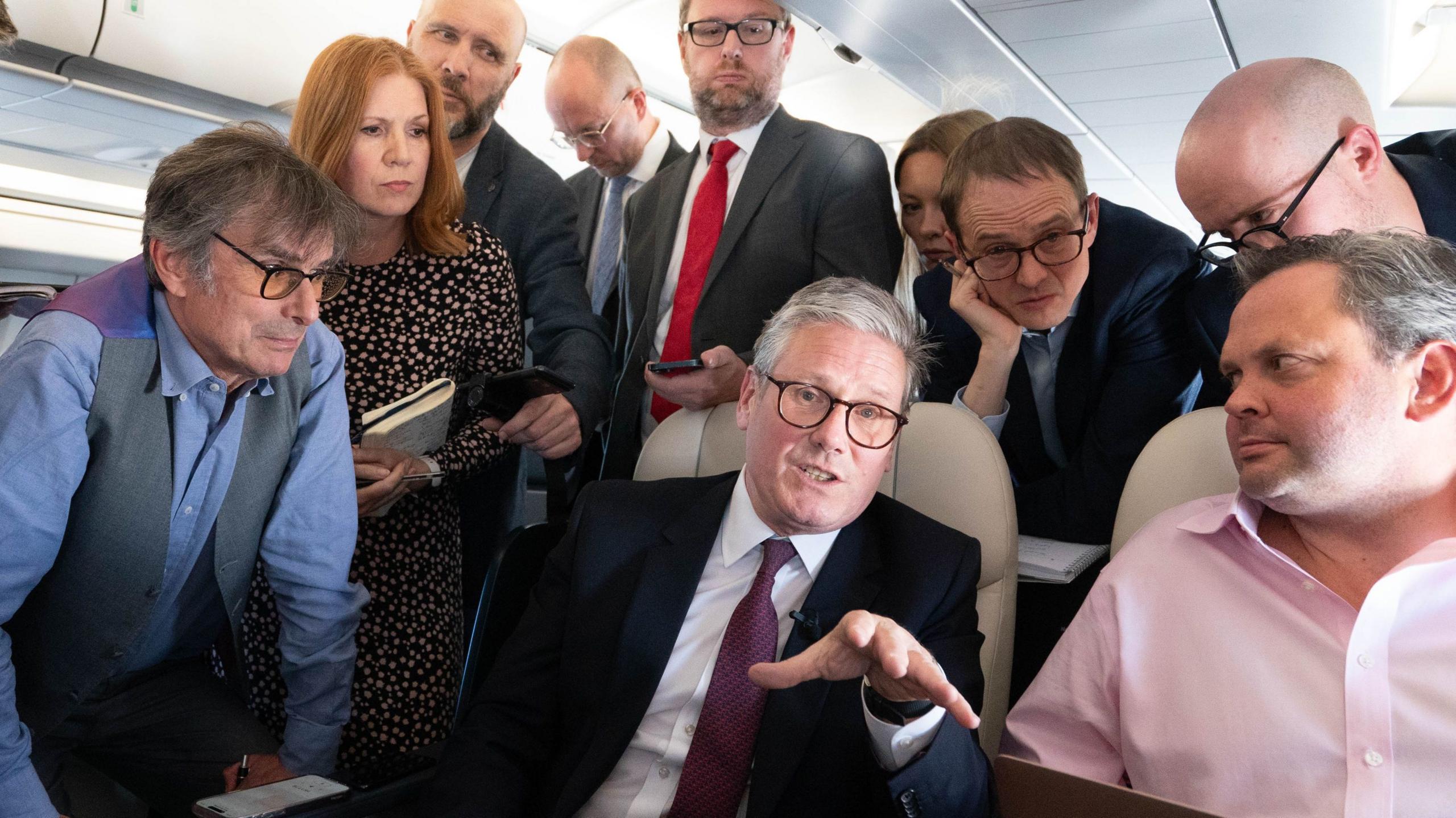Russia can end war now, says PM as Putin warns West

- Published
Russia started the conflict in Ukraine and can end it "straight away”, Sir Keir Starmer has said.
It comes after Russian President Vladimir Putin suggested Moscow would regard Western missiles being fired into Russia as a serious escalation of the war.
Putin told Russian state television that this would “mean nothing other than the direct participation of Nato countries - the US and European countries - in the war in Ukraine."
Sir Keir is in Washington for talks with US President Joe Biden on Friday, as allies of Kyiv discuss giving Ukraine permission to fire their missiles at targets inside Russia.
"It is their direct participation," he said. "And, of course, this substantially changes the very essence, the nature of the conflict.”
He added: “If that is the case, we will take corresponding decisions based on the threats that will be created to us.”
Asked for his response to the remarks on his flight to Washington, the prime minister struck a robust tone repeatedly stating that Russia had started the war.
“Russia started this conflict. Russia illegally invaded Ukraine. Russia can end this conflict straight away,” he said.
He later added: “To reiterate, it was Russia who started this in the first place. They caused the conflict, they’re the ones who are acting unlawfully.”
The prime minister and Foreign Secretary David Lammy are on a blitz of international diplomacy, as Ukraine’s allies discuss how to respond to Iran stepping up its weapons support for Russia.
Lammy told the BBC this “clearly changes the debate” as he visited Kyiv alongside the US Secretary of State, Antony Blinken.
On Sunday, the day after the prime minister returns from Washington, he will fly to Rome to meet the Italian Prime Minister, Georgia Meloni.
Italy currently holds the rotating presidency of the G7 group of industrialised countries.
A week later world leaders will gather in New York for the annual UN General Assembly.
There has long been a hesitancy to allow Ukraine to fire Western missiles into Russia because of fears it could be seen as provocative and draw the US, European countries and others directly into the conflict.
But with winter approaching and Russia getting extra support from Iran, minds appear to be changing.
When asked about the prospect of allowing the Anglo-French cruise missile called Storm Shadow to be used, the public remarks of senior figures remain guarded.
“There are really important developments likely in the next few weeks and months, both in Ukraine and the Middle East, and therefore a number of tactical decisions ought to be taken,” the prime minister told reporters, without disputing the issue is on the agenda.
He noted that both Blinken and Lammy had recently visited Ukraine.
"They're obviously with us to report into the process on a really important joint trip.”
What weapons are the UK and other countries giving Ukraine?
- Published17 February
What are Storm Shadow missiles and why are they crucial for Ukraine?
- Published20 November 2024
Russia claims start of fightback in Kursk region
- Published12 September 2024
Speaking earlier in the day, Putin said: “This isn’t about allowing or banning the Kyiv regime from striking Russian territory. It does that already with drones and by other means.
"But when we talk about high-precision, long-range weapons made in the West this is a completely different matter... The Ukrainian army is not able to strike with modern, high-precision, long-range systems. It can’t do this.
"It is only possible with intelligence data from satellites that Ukraine doesn’t have, data that’s only from satellites of the European Union, the USA, Nato satellites."
"The key point," he added, "is that only servicemen of Nato countries can input flight missions into these missile systems. Ukrainian servicemen cannot do this. Therefore this is not about permitting or not permitting the Ukrainian regime to strike Russia with these weapons.
"This is about whether or not Nato countries take the decision to directly participate in the military conflict.”
This is the prime minister’s second visit to Washington in a little over two months, having travelled here in July for the Nato Summit and a visit to the White House, shortly after winning the general election.
Sir Keir said he would not be meeting the vice-president and Democratic presidential nominee Kamala Harris during the visit.
When asked by journalists on the flight to the US, he said: “No, because she will be in other parts of the US as you'd expect, rather than Washington, she'll be as you'd expect in swing states... That's fine.”

Sign up for our Politics Essential newsletter to read top political analysis, gain insight from across the UK and stay up to speed with the big moments. It’ll be delivered straight to your inbox every weekday.